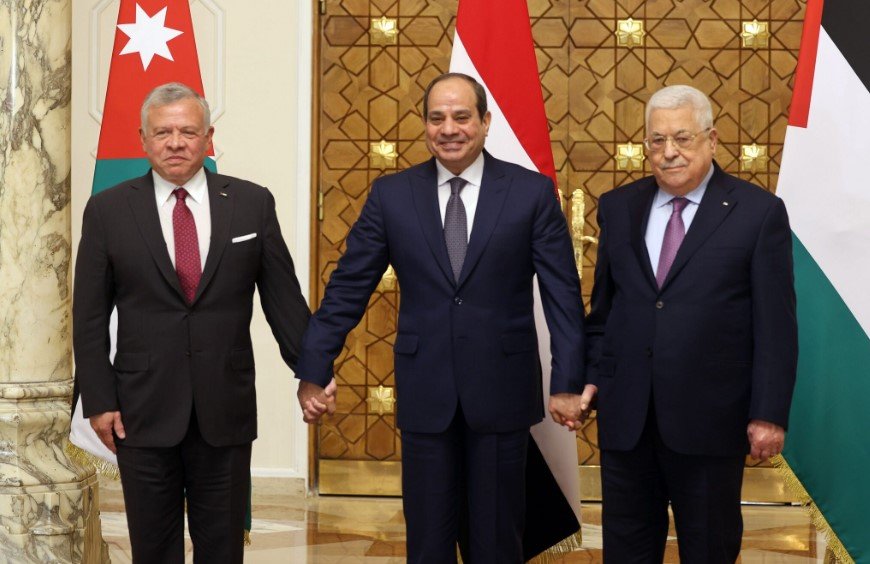Egypt’s President Abdel-Fattah al-Sisi has stepped up his calls for an immediate ceasefire in Gaza, urging swift humanitarian aid access to the war-torn territory. His appeal came during a high-level meeting with a senior US official, signaling a renewed diplomatic push to ease the escalating conflict.
As temperatures rise across the region, so does the urgency for peace. President Sisi met with Massad Boulos, the US senior adviser for Africa and presidential adviser on Arab and Middle Eastern affairs, in Cairo on Sunday. Together, they discussed the volatile situation unfolding in the Middle East and explored ways to bring stability back to the region.
Egypt’s Central Role in Mediation
In recent months, Egypt has been at the forefront of efforts to broker peace between Israel and Hamas. Sisi emphasized the importance of the joint mediation efforts by Egypt, the US, and Qatar, stressing Cairo’s ongoing commitment to coordination.
Egypt’s strategic location bordering Gaza gives it unique leverage in these talks. The country has historically played a crucial role in facilitating ceasefire agreements, humanitarian aid deliveries, and prisoner exchanges.

This meeting with Boulos was not just a formality. It was a clear message: Egypt intends to remain a key player, pressing for a halt to hostilities and urgent humanitarian relief.
US-Egypt Partnership on Regional Calm
Massad Boulos echoed these sentiments, reaffirming America’s dedication to working alongside Egypt. The US recognizes Egypt as an indispensable partner in navigating the turbulent Middle East landscape. Boulos said the two sides are committed to joint efforts that serve the interests of all parties involved, balancing security concerns with the pressing need to ease human suffering.
It’s a delicate dance — pushing for peace without alienating key players, while managing the expectations of regional and international stakeholders. Yet, both Egypt and the US appear to be in sync for now.
Indirect Talks in Doha Highlight Fragile Progress
The urgency of these diplomatic efforts was underscored by ongoing indirect negotiations between Israel and Hamas, held recently in Doha. Israel’s Prime Minister Benjamin Netanyahu’s office stated that an Israeli delegation is actively working to “realize every chance for a deal.” The goals are clear: end the fighting, secure the release of 58 hostages still held in Gaza, expel Hamas militants, and disarm the enclave.
But reaching an agreement remains painfully complex. Both sides carry heavy political and emotional baggage. The Gaza Strip has been under a blockade for years, and violence has flared repeatedly. Peace talks often stall over terms seen as non-negotiable by one side or the other.
Yet, these indirect negotiations represent a fragile thread of hope, a chance to avoid further bloodshed and destruction.
Humanitarian Crisis and the Need for Aid
Behind the political chessboard, millions in Gaza are facing a deepening humanitarian crisis. Access to food, medical supplies, clean water, and electricity is severely limited. Egypt’s call to facilitate humanitarian aid is not just a diplomatic talking point — it’s a desperate plea for survival.
Aid agencies have repeatedly warned about the catastrophic impact of continued conflict on civilians. Hospitals struggle to function without power. Families are displaced, and basic necessities grow scarce.
Egypt’s push for open corridors to deliver aid is crucial. Without it, the humanitarian toll will continue to climb.
The Stakes Are High
Why does Egypt care so much? It’s about regional stability, security, and the risk of wider conflict. An uncontrolled escalation in Gaza could spill over, affecting neighboring countries and undermining fragile peace in the Middle East.
Plus, Egypt has domestic concerns. Its own citizens watch closely, many sharing cultural and family ties with Palestinians. The government faces pressure to act decisively, balancing international diplomacy with domestic sentiment.
Here’s a quick look at key aspects of Egypt’s involvement:
| Factor | Detail |
|---|---|
| Geographic Position | Borders Gaza, key for aid and ceasefire |
| Mediation Role | Lead negotiator alongside US and Qatar |
| Humanitarian Efforts | Calls for aid corridors to Gaza |
| Political Stakes | Seeks regional stability and security |
| US-Egypt Partnership | Joint diplomatic coordination |
This matrix shows why Egypt’s voice carries weight and why its push for peace is more than symbolic.
What’s Next?
The road ahead looks rocky. With hostilities ongoing and trust in short supply, no one expects an overnight solution. But Egypt’s active role — alongside the US and Qatar — offers at least a platform for dialogue.
Will the ceasefire calls turn into lasting peace? Will aid finally reach those trapped in Gaza’s crisis? These are questions the world watches closely.
For now, the focus is on keeping talks alive, ensuring humanitarian access, and preventing the conflict from widening.
